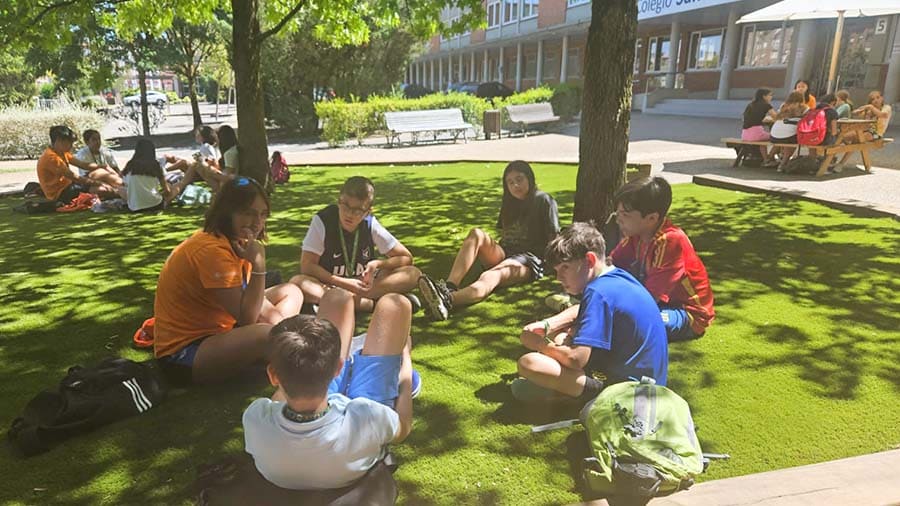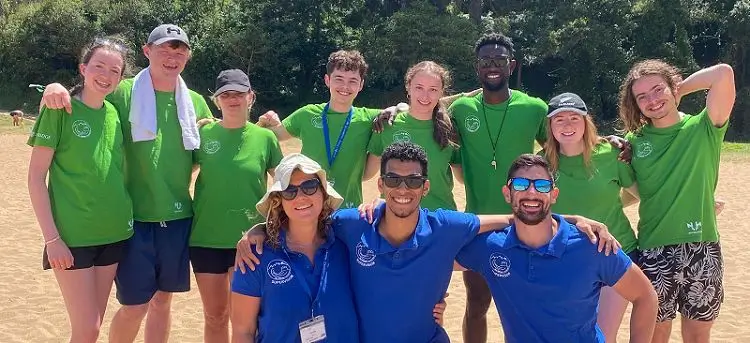Choosing an English camp is an exciting decision, but not always an easy one. Many parents come across offers that promise “English all day” and, in the end, discover that their children have barely practiced a few scattered phrases. It’s natural to wonder how to make sure that the effort and investment translate into real learning. The key is to identify what sets apart a truly immersive English camp from those that only include the language in a superficial way. Knowing these signs will help you make an informed decision and ensure that your child enjoys a fun and, at the same time, enriching summer.
Why not all camps really teach English
Although many camps present themselves as “English camps,” the reality is that not all of them offer true language immersion. In some cases, English is limited to just a few hours of class a day or occasional activities with English vocabulary. This can be fun, but it doesn’t guarantee that children will gain fluency or confidence in expressing themselves.
A real English camp is one where the language is present at all times: in sports activities, in creative workshops, on excursions, and even in everyday conversations with counselors and peers. For this reason, families who want visible progress often look for a full immersion summer camp in Spain, where English is lived naturally throughout the entire day.
For parents, understanding this distinction is essential. A camp with authentic immersion does not just teach English, but creates an environment where children think, play, and live in English, multiplying the impact of learning.
Signs of an immersive English camp
To identify a camp that truly enhances learning, it’s worth paying attention to some clear signs. These are the most important:
Qualified native or bilingual counselors
The staff is the key to immersion. If the counselors are native speakers or certified bilinguals, every interaction becomes an opportunity for natural learning. In addition, they convey not only the language but also cultural expressions and authentic ways of communication.
Activities 100% in English
An immersive camp doesn’t leave English only for classes. The language must be present in sports, crafts, excursions, or even in everyday moments like meals. This way, children get used to thinking and responding in English effortlessly.
Multicultural environment
The presence of children from different nationalities increases the motivation to use English as the common language. This coexistence creates a realistic environment where the language becomes a communication tool rather than just another subject.
When these three factors come together, the result is a camp where children not only learn but use English naturally, gain fluency, and have fun in the process.
Benefits of summer immersion for children
Summer is an ideal time for children to advance in language learning because they are more relaxed and open to new experiences. An immersive English camp takes advantage of this natural disposition to enhance results that go beyond academics.
Oral fluency from day one
By living in English through all activities, children are forced to speak without fear of making mistakes. This helps them become more fluent and lose shyness much faster than in a traditional course.
Useful and practical vocabulary
Learning is not focused on word lists but on vocabulary used in real life: giving instructions in a game, asking for materials in a workshop, or talking to a new friend. This practical use makes words easier to remember and apply.
Confidence in self-expression
Immersion boosts linguistic self-esteem. Children discover that they are capable of communicating, even when they don’t master the whole language, and that motivates them to keep learning enthusiastically.
Together, these benefits turn summer into a natural accelerator for learning, with visible results both in comprehension and oral expression.
Differences between a bilingual camp and an English camp
When looking for summer options, it’s common to find offers under two different labels: bilingual camp and English camp. Although they may seem similar, they actually offer very different experiences.
A bilingual camp usually combines activities in Spanish with occasional moments in English. It may include language classes, guided games, or themed workshops, but most of the interactions and communication among children happen in Spanish. This can be positive for those looking for a first contact, but the level of English exposure is limited.
On the other hand, an immersive English camp makes English the main language of communication. From breakfast to the last activity of the day, English is present in every interaction. This forces children to use the language as a real tool for socializing, which multiplies their learning and strengthens their confidence.
Practical comparison
|
Aspect |
Bilingual camp |
Immersive English camp |
|
Language of interaction |
Spanish + activities in English |
English at all times |
|
English classes |
Yes, but limited |
Natural learning through activities |
|
Relationships between children |
Mainly in Spanish |
English as the common language |
|
Level of learning |
Moderate progress |
Fast and visible improvement |
Being able to tell the difference between these two options is key for parents who truly want to see a leap in their children’s English level.
How to choose a camp that combines fun and learning
A good English camp should not force you to choose between fun and learning. When immersion is well designed, children learn naturally while playing, practicing sports, or joining creative workshops. That is the essence of an enriching summer: having fun and returning home with a much stronger level of English.
At Camp The Village we take care of every detail to achieve this balance. Our team of native and bilingual counselors is trained to ensure that English is the language of interaction from day one. All activities—sports, cultural, and social—are conducted in English, creating an immersive environment where children have fun while reinforcing their fluency and confidence.
Parents know that this is not about a few hours of class, but about a complete experience that combines authentic learning with unforgettable moments. That’s why those looking for an English camp where real learning happens find in Camp The Village the safest and most effective option for their children.




